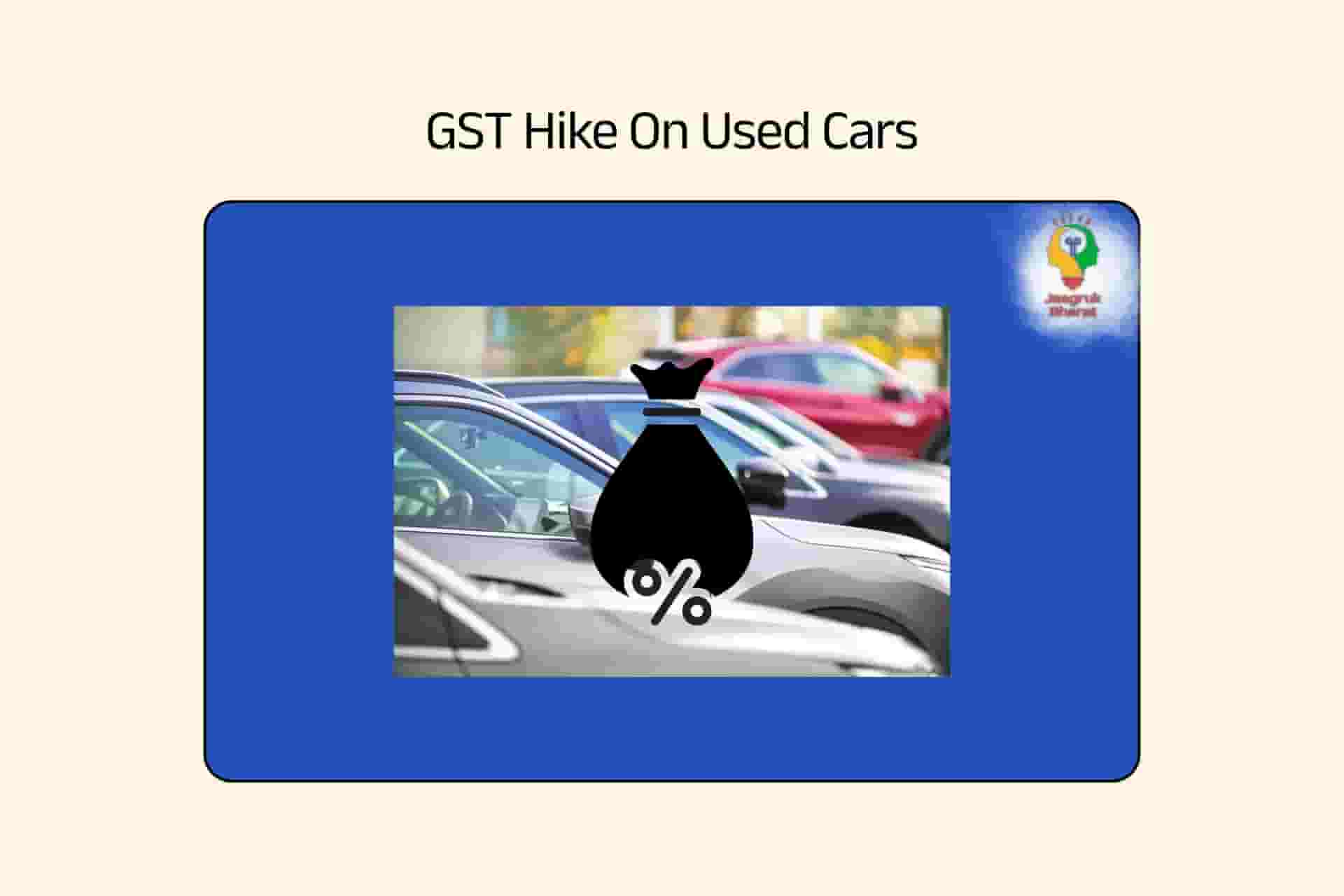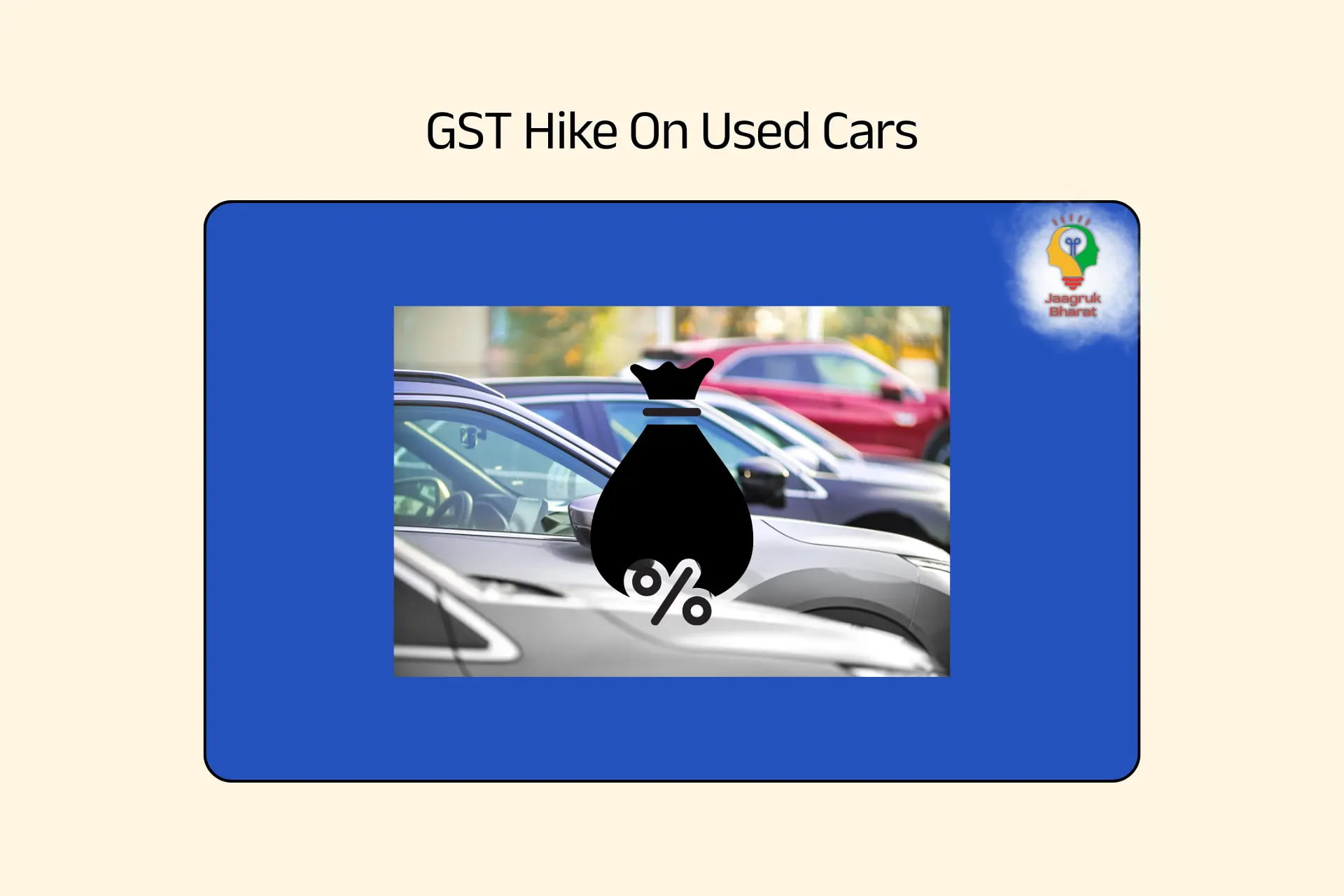GST Hike On Used Cars: What It Means For Buyers And Businesses?
Updated: 13-10-2025 at 7:33 AM
1k


The GST Council has proposed raising GST from 12% to 18% based on the margin value of used cars. This change will affect petrol cars with a certified engine capacity of 1200cc and above for cars, diesel cars with an accredited engine capacity of 1500cc and above, as well as all EVs. However, the rule does not apply to vehicles sold by persons who have not registered with the agency.
In this article, you will get the details about, how the new GST rate will affect individuals and businesses.
How Is GST Calculated On Used Cars?
GST is charged at 18% on the margin value of the car, calculated as:
Cost of sales = Saleless for the period / Sale Price – Opening Stock – Purchase or Depreciated Value
-
If the margin is negative (i.e., the car is sold at a loss): No GST is payable.
-
Condition: It is wrong that the input tax credit (ITC) has been availed on the car.
Who Has To Pay GST On Used Cars?
GST is paid by registered sellers or dealers, not unregistered individuals. For dealers using the margin scheme, GST is charged only on the profit margin if no ITC was claimed.
Registered Sellers:
-
GST, however, is paid only by registered persons, that is, sellers or other types of business entities.
-
For unregistered sellers, the percentage of GST charged on the sales of used cars is zero.
Dealers Using the Margin Scheme:
-
Dealers can pay GST on the margin (Selling price less the purchase price).
-
When a purchase is subject to ITC, GST is paid on the total sale consideration as opposed to the margin.
Impact On Different Sellers And Models
The two major models which hold the key impact of the increased GST Rate are Marketplace Models and Inventory-Based Models.
Marketplace Models:
-
These services GST is chargeable only if the seller is registered under GST.
-
If the seller selling goods is not registered, then they are not required to charge GST.
Inventory-Based Models:
-
GST is charged based on the margin or sale value out of the turnover where ITC cannot exceed the sale value.
Also Read: Centre Introduces Biometric ID To Fight GST Fraud In India
Effect On Buyers And Businesses
The following are some details about the effects on buyers and businesses under the increased GST Rate.
End Consumers:
-
Buyers purchasing goods or services from a GST-registered dealer will now pay 6% more GST than before which is 18% instead of 12%.
Businesses Claiming Depreciation:
-
Where depreciation is claimed under the Income Tax Act, GST is charged on the sale price less the agreed depreciated value.
-
Example:
-
Purchase Price: ₹10,00,000.
-
Depreciated Value: ₹9,00,000 reducing by 10% annually.
-
Sale Price: ₹9,50,000.
-
The profit earned in each transaction of this product is a margin of ₹50,000 on which GST is levied.
-
Businesses Without Depreciation Claims: As mentioned, GST is levied on the manufacture or sale of any goods, computed on the idea of margin which is the sale price minus the purchase price.
Also Read: Difference Between GST Compensation Cess And Income Tax Cess?
Key Scenarios For GST On Used Cars
Below listed points below are about the essential scenarios for the GST on used cars.
Dealer Buys at ₹5 Lakh, Sells at ₹7 Lakh:
-
Margin: ₹2 Lakh
-
GST (18%): ₹36,000
Dealer Buys at ₹12 Lakh, Sells at ₹11 Lakh (Depreciation of ₹2 Lakh):
-
Depreciated Value: ₹10 Lakh
-
Margin: ₹1 Lakh
-
GST (18%): ₹18,000
Dealer Sells at a Loss:
- No GST is applicable.
Small Cars And Exemptions
The following are some details about the small cars and exemptions under the increased GST Rate.
-
Small petrol cars (engine <1200cc, length <4000mm): GST remains at 12%.
-
Example: The second-hand Renault Kwid falls under the 12% rate.
Also Read: GST Registration Certificate - Download Process & How To Make Updates
Conditions For The Margin Scheme
To use the margin scheme under GST, the following conditions must be met:
-
The car must be a used car, (previously owned or was on the road before in the possession of the borrower).
-
Minor repair is permissible but it is important to remember the car can not alter its nature.
-
There should be no ITC claimed in respect of the car at the time of its purchase.
Conclusion
The GST rate increase from 12% to 18% on used cars majorly affects the businesses of cars of big-time capacities and their buyers. Small cars are reduced by 12% cheaper, but it will cost consumers who buy from registered dealers. That is when the margin scheme is used, dealers achieve a lower tax charge in so far as ITC cannot be claimed.
For any queries, share your opinions, or any updates or information, visit Jaagruk Bharat's community page. Be a part of India’s biggest Jaagruk community.
Frequently Asked Questions
0
0
1k
0
0
1k Views
0
No comments available





Our Company
Home
About
T&C
Privacy Policy
Eula
Disclaimer Policy
Code of Ethics
Contact Us
Careers
Cancellation & Refund Policy
Categories
Women
Insurance
Finance
Tax
Travel
Transport & Infrastructure
Food
Entertainment
Communication
Government ID Cards
E-commerce
Traffic guidelines
Miscellaneous
Housing and Sanitation
Sports
Startup
Environment and Safety
Education
Agriculture
Social cause
Employment
Disclaimer: Jaagruk Bharat is a private organization offering support for documentation and government scheme access. We are not affiliated with any government body. Official services are available on respective government portals. Our goal is to make processes easier and more accessible for citizens.
All Copyrights are reserved by Jaagruk Bharat